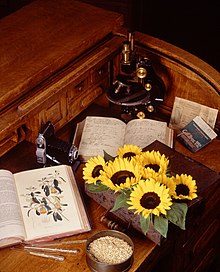
Back تاريخ علم النبات Arabic Historia de la botánica AST Historija botanike BS Història de la botànica Catalan Ботаника историйĕ CV Historia de la botánica Spanish تاریخ گیاهشناسی Persian Histoire de la botanique French Historia da botánica Galician वनस्पतिविज्ञान का इतिहास Hindi

The history of botany examines the human effort to understand life on Earth by tracing the historical development of the discipline of botany—that part of natural science dealing with organisms traditionally treated as plants.
Rudimentary botanical science began with empirically based plant lore passed from generation to generation in the oral traditions of paleolithic hunter-gatherers. The first writings that show human curiosity about plants themselves, rather than the uses that could be made of them, appear in ancient Greece and ancient India. In Ancient Greece, the teachings of Aristotle's student Theophrastus at the Lyceum in ancient Athens in about 350 BC are considered the starting point for Western botany. In ancient India, the Vṛkṣāyurveda, attributed to Parashara, is also considered one of the earliest texts to describe various branches of botany.[1]
In Europe, botanical science was soon overshadowed by a medieval preoccupation with the medicinal properties of plants that lasted more than 1000 years. During this time, the medicinal works of classical antiquity were reproduced in manuscripts and books called herbals. In China and the Arab world, the Greco-Roman work on medicinal plants was preserved and extended.
In Europe, the Renaissance of the 14th–17th centuries heralded a scientific revival during which botany gradually emerged from natural history as an independent science, distinct from medicine and agriculture. Herbals were replaced by floras: books that described the native plants of local regions. The invention of the microscope stimulated the study of plant anatomy, and the first carefully designed experiments in plant physiology were performed. With the expansion of trade and exploration beyond Europe, the many new plants being discovered were subjected to an increasingly rigorous process of naming, description, and classification.
Progressively more sophisticated scientific technology has aided the development of contemporary botanical offshoots in the plant sciences, ranging from the applied fields of economic botany (notably agriculture, horticulture and forestry), to the detailed examination of the structure and function of plants and their interaction with the environment over many scales from the large-scale global significance of vegetation and plant communities (biogeography and ecology) through to the small scale of subjects like cell theory, molecular biology and plant biochemistry.
- ^ Prasad, G. P. (Jan–Jun 2016). "Vŗkşăyurvĕda of Parăśara--an ancient treatise on plant science". Bulletin of the Indian Institute of History of Medicine (Hyderabad). 36 (1): 63–74.
© MMXXIII Rich X Search. We shall prevail. All rights reserved. Rich X Search